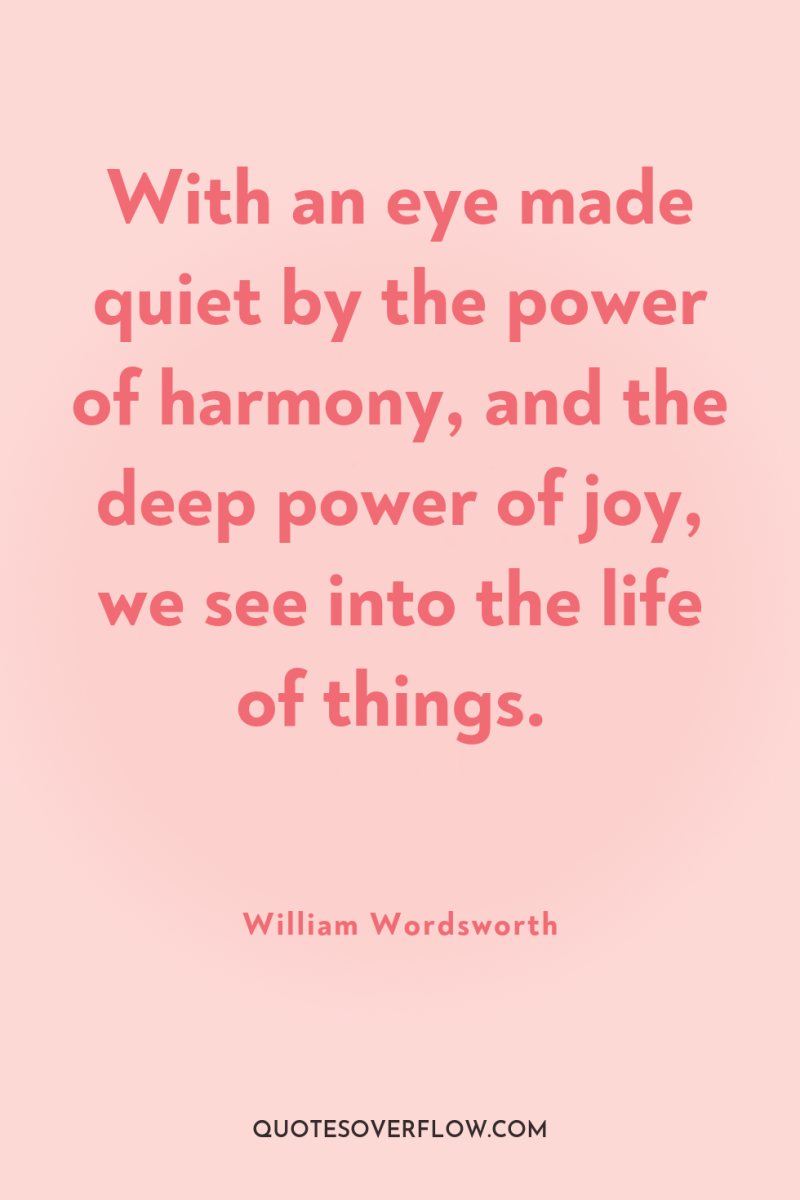
With an eye made quiet by the power of harmony, and the deep power of joy, we see into the life of things.William Wordsworth
Habit rules the unreflecting herd.William Wordsworth
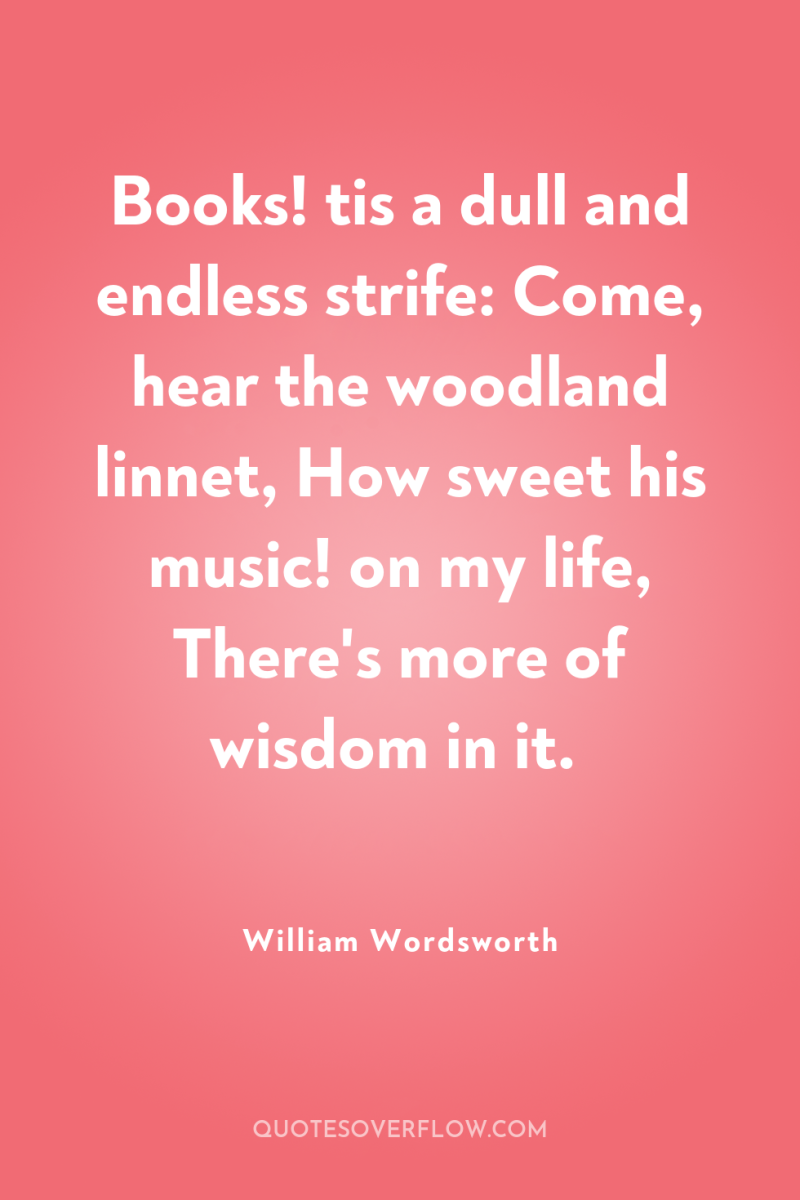
Books! tis a dull and endless strife: Come, hear the woodland linnet, How sweet his music! on my life, There's more of wisdom in it.William Wordsworth
Though nothing can bring back the hour Of splendor in the grass, of glory in the flower; We will grieve not, rather find Strength in what remains behind; In the primal sympathy Which having been must ever be...William Wordsworth
The thought of our past years in me doth breed Perpetual benediction: not indeed For that which is most worthy to be blest– Delight and liberty, the simple creed Of Childhood, whether busy or at rest, With new-fledged hope still fluttering in his breast.William Wordsworth
What though the radiance which was once so bright Be now for ever taken from my sight, Though nothing can bring back the hour Of splendour in the grass, of glory in the flower; We will grieve not, rather find Strength in what remains behind; In the primal sympathy Which having been must ever be; In the soothing thoughts that spring Out of human suffering; In the faith that looks through death, In years that bring the philosophic mind.William Wordsworth

Nature never did betray The heart that loved her.William Wordsworth
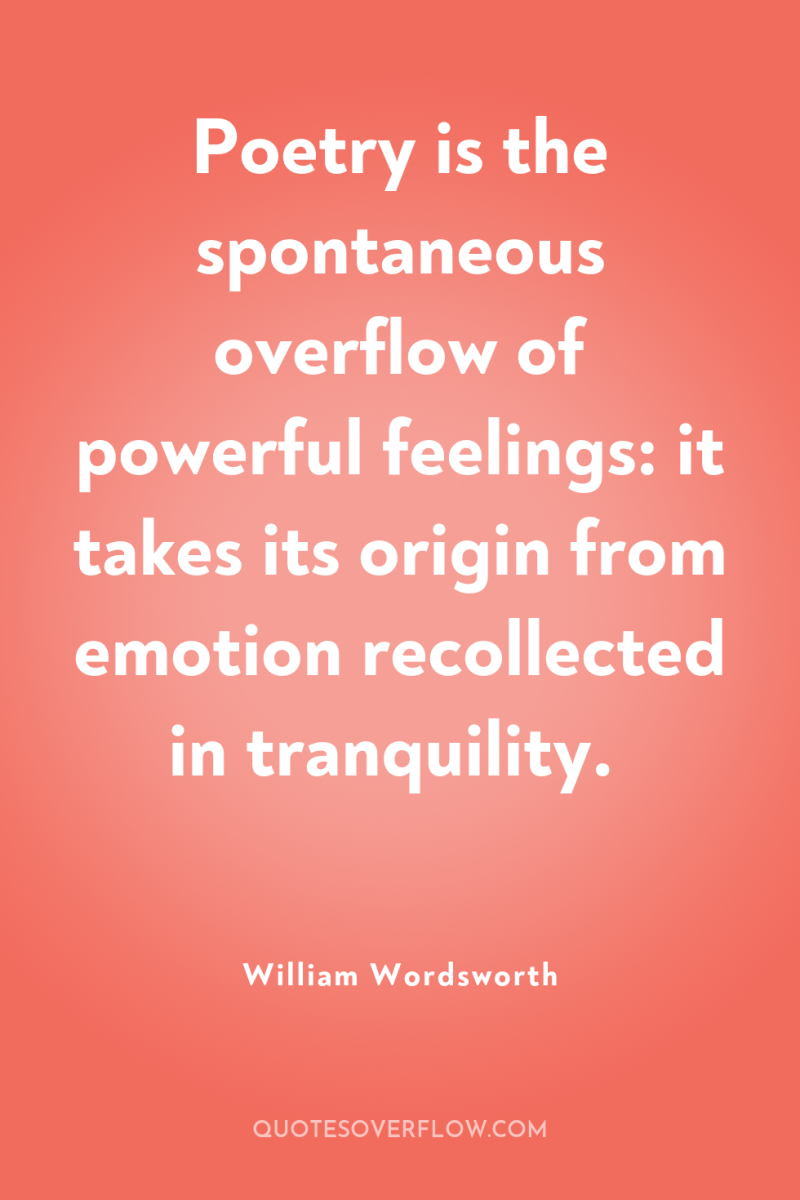
Poetry is the spontaneous overflow of powerful feelings: it takes its origin from emotion recollected in tranquility.William Wordsworth
Our birth is but a sleep and a forgetting: The Soul that rises with us, our life's Star, Hath had elsewhere its setting, And cometh from afar: Not in entire forgetfulness, And not in utter nakedness, But trailing clouds of glory do we comeWilliam Wordsworth
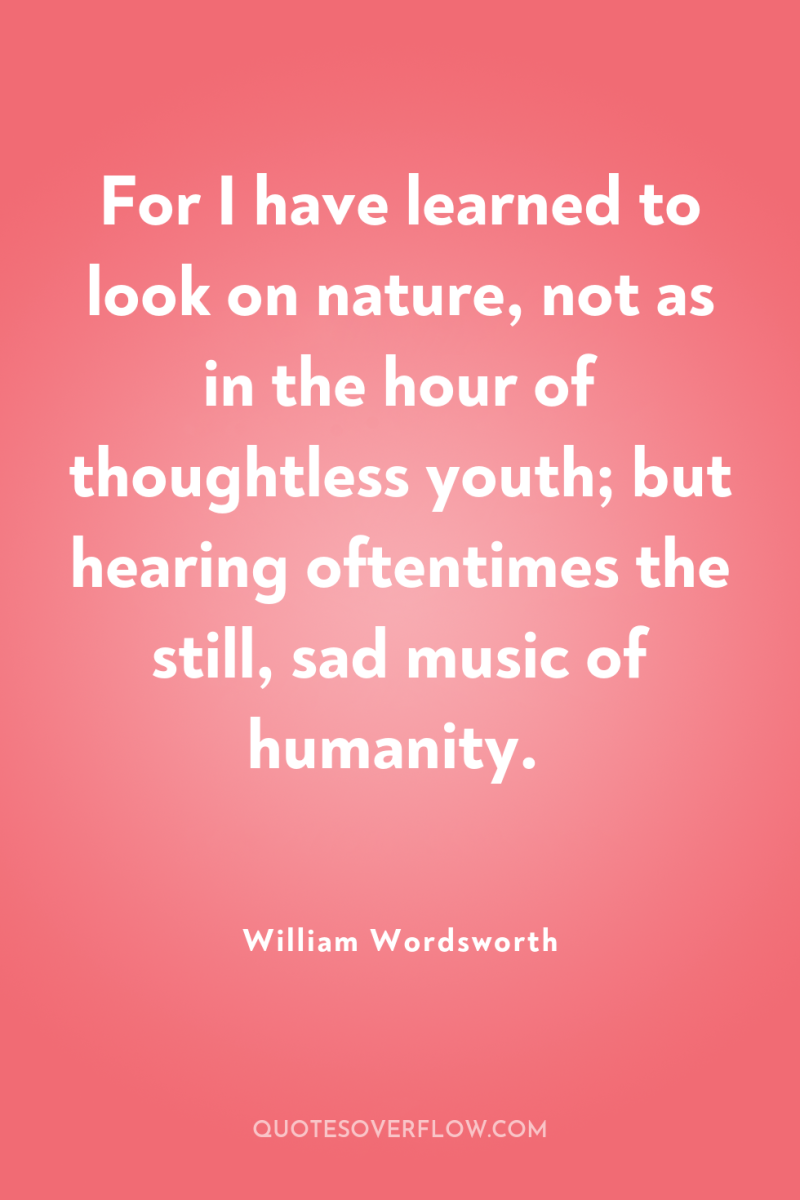
For I have learned to look on nature, not as in the hour of thoughtless youth; but hearing oftentimes the still, sad music of humanity.William Wordsworth
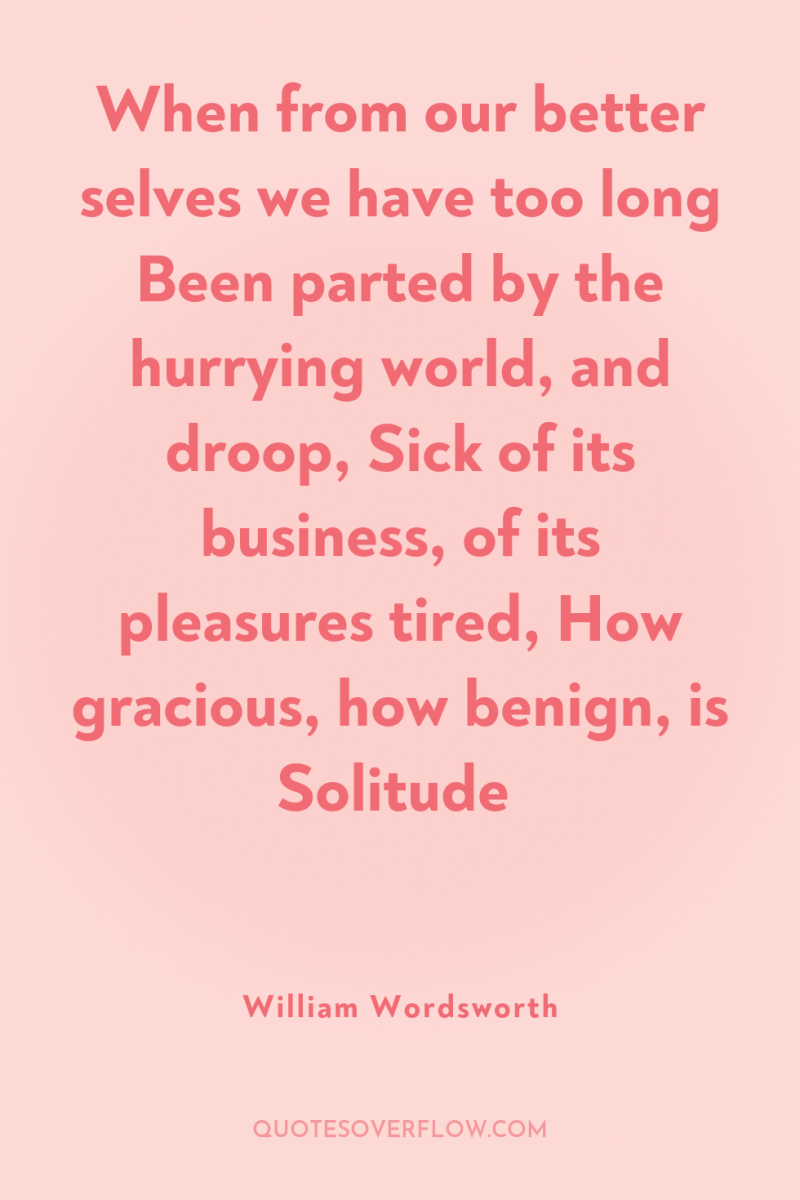
When from our better selves we have too long Been parted by the hurrying world, and droop, Sick of its business, of its pleasures tired, How gracious, how benign, is SolitudeWilliam Wordsworth
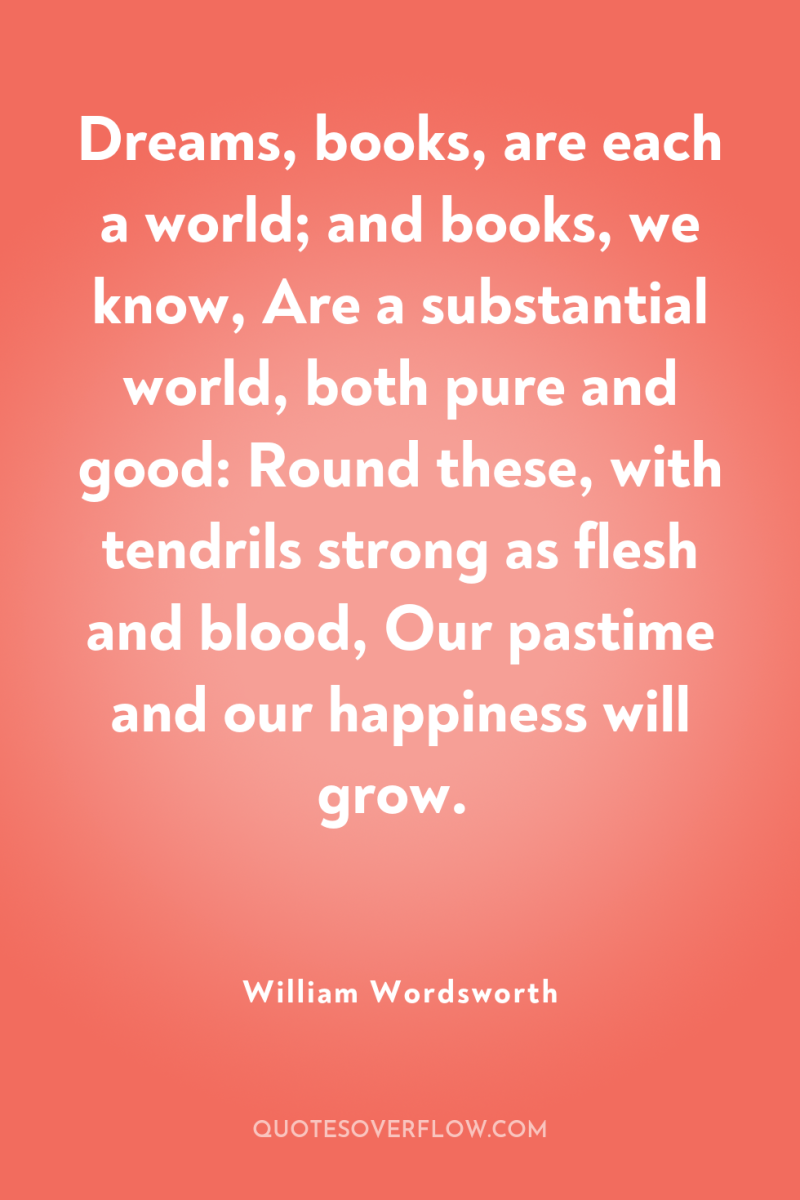
Dreams, books, are each a world; and books, we know, Are a substantial world, both pure and good: Round these, with tendrils strong as flesh and blood, Our pastime and our happiness will grow.William Wordsworth
Lines Written In Early SpringI heard a thousand blended notes, While in a grove I sate reclined, In that sweet mood when pleasant thoughts Bring sad thoughts to the mind. To her fair works did Nature link The human soul that through me ran; And much it grieved my heart to think What man has made of man. Through primrose tufts, in that green bower, The periwinkle trailed its wreaths; And 'tis my faith that every flower Enjoys the air it breathes. The birds around me hopped and played, Their thoughts I cannot measure:-- But the least motion which they made It seemed a thrill of pleasure. The budding twigs spread out their fan, To catch the breezy air; And I must think, do all I can, That there was pleasure there. If this belief from heaven be sent, If such be Nature's holy plan, Have I not reason to lament What man has made of man? .William Wordsworth
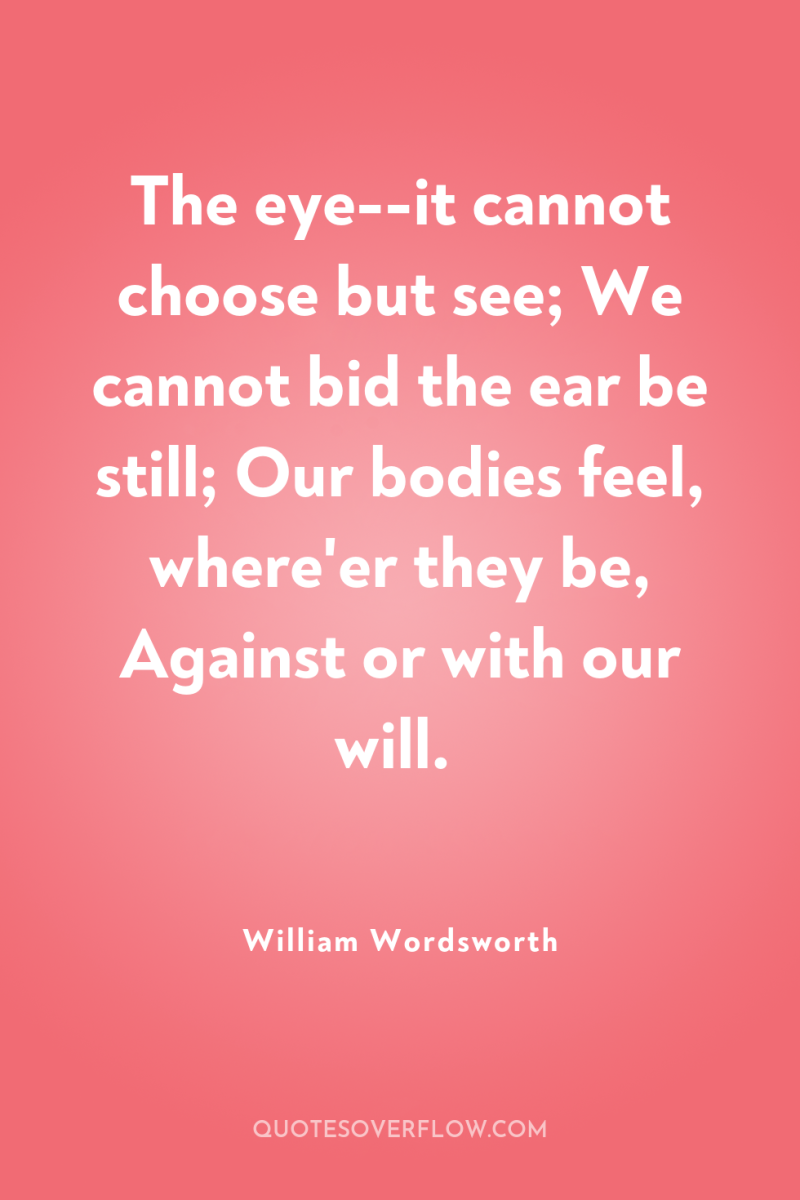
The eye--it cannot choose but see; We cannot bid the ear be still; Our bodies feel, where'er they be, Against or with our will.William Wordsworth

One impulse from a vernal wood May teach you more of man, Of moral evil and of good, Than all the sages can.William Wordsworth
Surprised by joy- impatient as the WindI turned to share the transport-- Oh! with whom But thee, deep buried in the silent tomb, That spot which no vicissitude can find? Love, faithful love, recalled thee to my mind-- But how could I forget thee? Through what power, Even for the least division of an hour, Have I been so beguiled as to be blind To my most grievous loss? -- That thought's return Was the worst pang that sorrow ever bore, Save one, one only, when I stood forlorn, Knowing my heart's best treasure was no more; That neither present time, nor years unborn Could to my sight that heavenly face restore.William Wordsworth
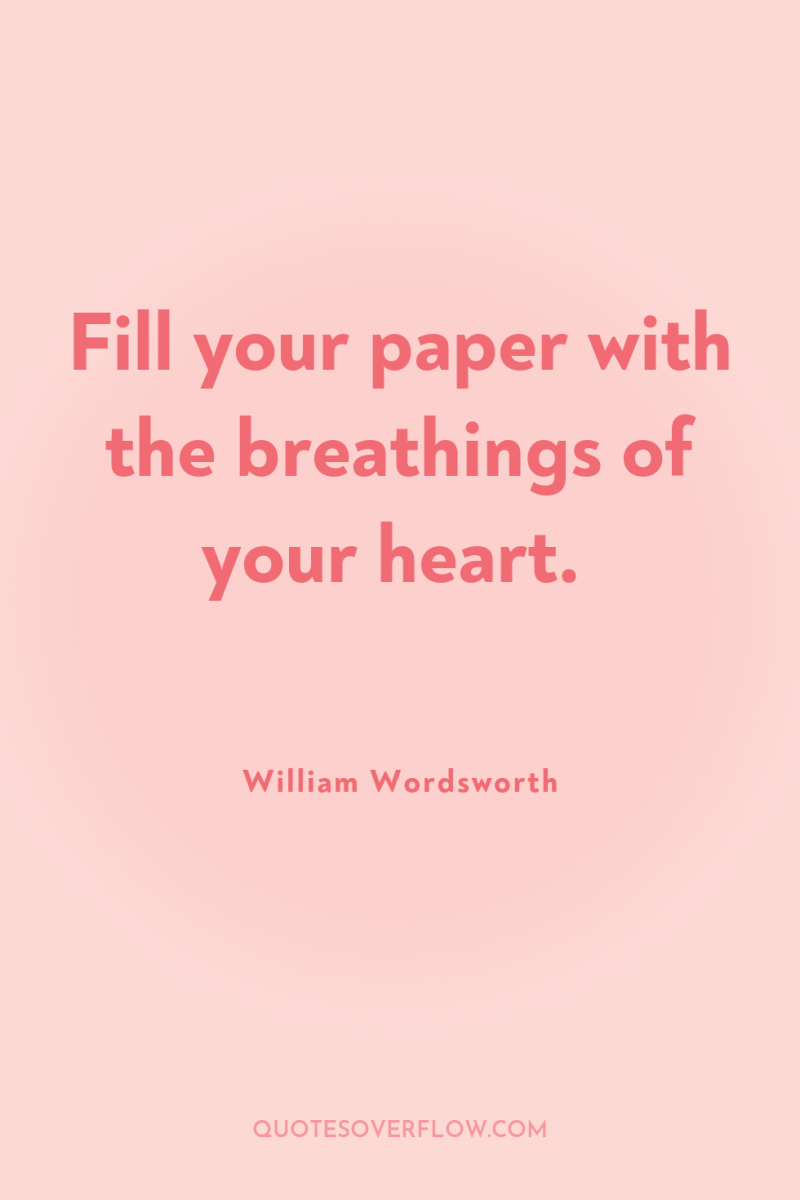
Fill your paper with the breathings of your heart.William Wordsworth
...The happy Warrior... is he... who, with a natural instinct to discern what knowledge can perform, is diligent to learn; abides by this resolve, and stops not there, but makes his moral being his prime care.William Wordsworth
..........books are yours, Within whose silent chambers treasure lies Preserved from age to age; more precious far Than that accumulated store of gold And orient gems, which, for a day of need, The Sultan hides deep in ancestral tombs. These hoards of truth you can unlock at will:William Wordsworth
For a multitude of causes, unknown to former times, are now acting with a combined force to blunt the discriminating powers of the mind, and unfitting it for all voluntary exertion to reduce it to a state of almost savage torpor... To this tendency of life and manners the literature and theatrical exhibitions of the country have conformed themselves.William Wordsworth
Such views the youthful Bard allure, But, heedless of the following gloom, He deems their colours shall endure' Till peace go with him to the tomb.– And let him nurse his fond deceit, And what if he must die in sorrow! Who would not cherish dreams so sweet, Though grief and pain may come tomorrow?William Wordsworth
Therefore am I still / A lover of the meadows and the woods, / And mountains; and of all that we behold / From this green earth; of all the mighty world / Of eye and ear, both what they half create / And what perceive; well pleased to recognize / In nature and the language of the sense, / The anchor of my purest thoughts, the nurse/ The guide, the guardian of my heart, and soul / Of all my moral being.William Wordsworth
This is the way in which he (poet) did his work. He used to go out with a pencil and a tablet and note what struck him..and make a picture out of it.. But Nature does not allow an inventory to be made of her charms! He should have left his pencil behind, and gone forth in a meditative spirit; and, on a later day, he should have embodied in verse not all that he had noted but what he best remembered of the scene; and he would have then presented us with its soul, and not with the mere visual aspect of it.William Wordsworth
..The happy Warrior.. 'tis he whose law is reason; who depends upon that law as on the best of friends; whence, in a state where men are tempted still to evil for a guard against worse ill, and what in quality or act is best doth seldom on a right foundation rest, he labors good on good to fix, and owes to virtue every triumph that he knows: who, if he rise to station of command, rises by open means; and there will stand on honorable terms, or else retire, and in himself possess his own desire; who comprehends his trust, and to the same keeps faithful with a singleness of aim; and therefore does not stoop, nor lie in wait for wealth, or honors, or for worldly state; whom they must follow; on whose head must fall, like showers of manna, if they come at all: .William Wordsworth
..The happy Warrior.. is he.. whose powers shed round him in the common strife, or mild concerns of ordinary life, a constant influence, a peculiar grace; but who, if he be called upon to face some awful moment to which Heaven has joined great issues, good or bad for human kind, is happy as a lover; and attired with sudden brightness, like a man inspired; and, through the heat of conflict, keeps the law in calmness made, and sees what he foresaw; or if an unexpected call succeed, come when it will, is equal to the need: he who, though thus endued as with a sense and faculty for storm and turbulence, is yet a soul whose master-bias leans to homefelt pleasures and to gentle scenes; sweet images! which, wheresoe'er he be, are at his heart; and such fidelity it is his darling passion to approve; more brave for this, that he hath much to love:— .William Wordsworth
The world is too much with us; late and soon, Getting and spending, we lay waste our powers; Little we see in Nature that is ours; We have given our hearts away, a sordid boon! This Sea that bares her bosom to the moon, The winds that will be howling at all hours, And are up-gathered now like sleeping flowers, For this, for everything, we are out of tune; It moves us not.-- Great God! I'd rather be A Pagan suckled in a creed outworn; So might I, standing on this pleasant lea, Have glimpses that would make me less forlorn; Have sight of Proteus rising from the sea; Or hear old Triton blow his wreathed horn.William Wordsworth
I wandered lonely as a cloud That floats on high o'er vales and hills When all at once I saw a crowd A host of golden daffodils Beside the lake beneath the trees Fluttering and dancing in the breeze.William Wordsworth
For I have learned To look on nature, not as in the hour Of thoughtless youth; but hearing oftentimes The still, sad music of humanity, Nor harsh nor grating, though of ample power To chasten and subdue. And I have felt A presence that disturbs me with the joy Of elevated thoughts; a sense sublime Of something far more deeply interfused, Whose dwelling is the light of setting suns, And the round ocean and the living air, And the blue sky, and in the mind of man; A motion and a spirit, that impels All thinking things, all objects of all thought, And rolls through all things. Therefore am I still A lover of the meadows and the woods, And mountains; and of all that we behold From this green earth; of all the mighty world Of eye, and ear, –both what they half create, And what perceive; well pleased to recognise In nature and the language of the sense, The anchor of my purest thoughts, the nurse, The guide, the guardian of my heart, and soul Of all my moral being.William Wordsworth
The pleasure-house is dust:–behind, before, This is no common waste, no common gloom; But Nature, in due course of time, once more Shall here put on her beauty and her bloom. She leaves these objects to a slow decay, That what we are, and have been, may be known; But at the coming of the milder day, These monuments shall all be overgrown.William Wordsworth
I heard a thousand blended notes While in a grove I sate reclined, In that sweet mood when pleasant thoughts Bring sad thoughts to the mind. To her fair works did Nature link The human soul that through me ran; And much it grieved my heart to think What man has made of man.William Wordsworth
Rest and be thankful.William Wordsworth
I listen'd, motionless and still; And, as I mounted up the hill, The music in my heart I bore, Long after it was heard no more.William Wordsworth
A simple child. That lightly draws its breath. And feels its life in every limb. What should it know of death?William Wordsworth
Society has parted man from man, neglectful of the universal heart.William Wordsworth
What though the radiance which was once so bright Be now for ever taken from my sight, Though nothing can bring back the hour Of splendor in the grass, of glory in the flower; We will grieve not, rather find Strength in what remains behind.William Wordsworth
But thou art with us, with us in the past, The present, with us in the times to come. There is no grief, no sorrow, no despair, No languor, no dejection, no dismay, No absence scarcely can there be, for those Who love as we do. Speed thee well!William Wordsworth
The child is the father of the man.William Wordsworth
But trailing clouds of glory do we come from God, who is our home.William Wordsworth
..The happy Warrior.. 'tis, finally, the man, who, lifted high, conspicuous object in a nation's eye, or left unthought-of in obscurity, — who, with a toward or untoward lot, prosperous or adverse, to his wish or not— plays, in the many games of life, that one where what he most doth value must be won: whom neither shape or danger can dismay, nor thought of tender happiness betray; who, not content that former worth stand fast, looks forward, persevering to the last, from well to better, daily self-surpast: who, whether praise of him must walk the earth for ever, and to noble deeds give birth, or he must fall, to sleep without his fame, and leave a dead unprofitable name— finds comfort in himself and in his cause; and, while the mortal mist is gathering, draws his breath in confidence of Heaven's applause: this is the happy Warrior; this is he that every man in arms should wish to be.William Wordsworth
Suffering is permanent, obscure and dark, And has the nature of infinity.William Wordsworth
...The happy Warrior... is the generous Spirit, who, when brought among the tasks of real life, hath wrought upon the plan that pleased his boyish thought: whose high endeavors are an inward light that makes the path before him always bright.William Wordsworth
Words are too awful an instrument for good and evil to be trifled with: they hold above all other external powers a dominion over thoughts. If words be not (recurring to a metaphor before used) an incarnation of the thought but only a clothing for it, then surely will they prove an ill gift; such a one as those poisoned vestments, read of in the stories of superstitious times, which had power to consume and to alienate from his right mind the victim who put them on. Language, if it do not uphold, and feed, and leave in quiet, like the power of gravitation or the air we breathe, is a counter-spirit, unremittingly and noiselessly at work to derange, to subvert, to lay waste, to vitiate, and to dissolve.William Wordsworth
Fill your paper with the breathings of your heartWilliam Wordsworth
..The happy Warrior.. is he.. who, doomed to go in company with pain, and fear, and bloodshed, miserable train turns his necessity to glorious gain; in face of these doth exercise a power which is our human nature's highest dower: controls them and subdues, transmutes, bereaves of their bad influence, and their good receives: by objects, which might force the soul to abate her feeling, rendered more compassionate; is placable— because occasions rise so often that demand such sacrifice; more skillful in self-knowledge, even more pure, as tempted more; more able to endure, as more exposed to suffering and distress; thence, also, more alive to tenderness.William Wordsworth
Duty were our games.William Wordsworth
Go to the poets, they will speak to thee More perfectly of purer creatures--William Wordsworth
Here must thou be, O man, Strength to thyself – no helper hast thou here –Here keepest thou thy individual state: No other can divide with thee this work, No secondary hand can intervene To fashion this ability. 'Tis thine, The prime and vital principle is thine In the recesses of thy nature, far From any reach of outward fellowship, Else 'tis not thine at all.William Wordsworth
Our birth is but a sleep and a forgetting...William Wordsworth
What is a Poet? He is a man speaking to men: a man, it is true, endued with more lively sensibility, more enthusiasm and tenderness, who has a greater knowledge of human nature, and a more comprehensive soul, than are supposed to be common among mankind; a man pleased with his own passions and volitions, and who rejoices more than other men in the spirit of life that is in him; delighting to contemplate similar volitions and passions as manifested in the goings-on of the universe, and habitually impelled to create them where he does not find them.William Wordsworth
We not only wish to be pleased, but to be pleased in that particularway in which we have been accustomed to be pleased.William Wordsworth
Friend is the one who showes the way and walks a piece of road with usWilliam Wordsworth
A lake carries you into recesses of feeling otherwise impenetrable.William Wordsworth
In ourselves our safety must be sought. By our own right hand it must be wrought.William Wordsworth
Hence, in a season of calm weather Though inland far we be, Our souls have sight of that immortal seaWilliam Wordsworth
Whither is fled the visionary gleam? Where is it now, the glory and the dream?William Wordsworth
Is then no nook of English ground secure From rash assault?William Wordsworth
To character and success two things contradictory as they may seem must go together-humble dependence and manly independence: humble dependence on God and manly reliance on self.William Wordsworth
The child is father of the man.William Wordsworth
We must be free or die who speak the tongue That Shakespeare spake the faith and morals hold Which Milton held.William Wordsworth
Faith is a passionate intuition.William Wordsworth
That best portion of a good man's life His little nameless unremembered acts Of kindness and of love.William Wordsworth
The child is father to the man.William Wordsworth
To her fair works did Nature link The human soul that through me ran And much it grieved my heart to think What Man has made of Man.William Wordsworth
Nature never did betray the heart that loved her.William Wordsworth
Come forth into the light of things. Let nature be your teacher.William Wordsworth
My heart leaps up when I behold a rainbow in the sky.William Wordsworth
Nature is a volume of which God is the author.William Wordsworth
A man he seems of cheerful yesterdays And confident tomorrows.William Wordsworth
Fear is a cloak which old men huddle about their love as if to keep it warm.William Wordsworth
To character and success two things contradictory as they may seem must go together-humble dependence and manly independence humble dependence on God and manly reliance on self.William Wordsworth
She was a Phantom of delight When first she gleamed upon my sight A lovely Apparition sent To be a moment's ornament.William Wordsworth
Every great and original writer in proportion as he is great and original must himself create the taste by which he is to be relished.William Wordsworth
When from our better selves we have too long been parted by the hurrying world, and droop. Sick of its business, of its pleasures tired, how gracious, how benign is solitude.William Wordsworth
In modern business it is not the crook who is to be feared most, it is the honest man who doesn't know what he is doing.William Wordsworth
What is pride? A rocket that emulates the stars.William Wordsworth
Not without hope we suffer and we mourn.William Wordsworth
The best portion of a good man's life is his little, nameless, unremembered acts of kindness and of love.William Wordsworth
Golf is a day spent in a round of strenuous idleness.William Wordsworth
Come forth into the light of things, let nature be your teacher.William Wordsworth
The ocean is a mighty harmonist.William Wordsworth
Suffering is permanent, obscure and dark, And shares the nature of infinity.William Wordsworth
For I have learned to look on nature, not as in the hour of thoughtless youth, but hearing oftentimes the still, sad music of humanity.William Wordsworth
The world is too much with us; late and soon, getting and spending, we lay waste our powers: Little we see in Nature that is ours.William Wordsworth
That though the radiance which was once so bright be now forever taken from my sight. Though nothing can bring back the hour of splendor in the grass, glory in the flower. We will grieve not, rather find strength in what remains behind.William Wordsworth
I listened, motionless and still; And, as I mounted up the hill, The music in my heart I bore, Long after it was heard no more.William Wordsworth
But an old age serene and bright, and lovely as a Lapland night, shall lead thee to thy grave.William Wordsworth
The mind that is wise mourns less for what age takes away than what it leaves behind.William Wordsworth
That best portion of a man's life, his little, nameless, unremembered acts of kindness and love.William Wordsworth
Getting and spending, we lay waste our powers.William Wordsworth
The flower that smells the sweetest is shy and lowly.William Wordsworth
The human mind is capable of excitement without the application of gross and violent stimulants and he must have a very faint perception of its beauty and dignity who does not know this.William Wordsworth
Pictures deface walls more often than they decorate them.William Wordsworth
To begin, begin.William Wordsworth
Wisdom is oftentimes nearer when we stoop than when we soar.William Wordsworth
Life is divided into three terms - that which was, which is, and which will be. Let us learn from the past to profit by the present, and from the present, to live better in the future.William Wordsworth
How does the Meadow flower its bloom unfold? Because the lovely little flower is free down to its root, and in that freedom bold.William Wordsworth